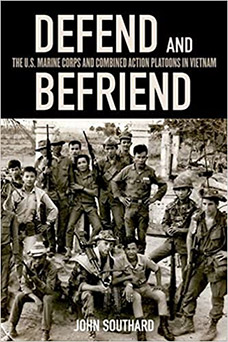John Southard has a PhD in U.S. Military history, and is an author, speaker and expert in empathetic leadership. He has applied his historical research on empathy to corporate America to build empathetic leaders and cultures and optimize customer and employee experiences. John is passionate about teaching clients how to harness the power of empathy to change lives both within and beyond your organization’s walls.
John’s book, Defend and Befriend, chronicles the greatest, yet unknown story of empathy in world history. He tracks a small group of U.S. Marines in the Vietnam War who leveraged the power of empathy to build a sustainable trust in the most unlikely of places. The marines, unbeknownst to them, actually laid the foundation for a unique empathy framework that companies today can use to build trust with customers and employees. After studying this group of marines for more than a decade, John has applied their empathy playbook in the corporate world, which has yielded impressive business returns.
Featured Topics:
The Empathy Advantage: Harnessing the Historical Power of Empathy to Build Lifelong Trust With Customers
Research shows that the lack of empathy in today’s fast-paced business world is costing companies millions of dollars in lost revenue every year. Customers long for companies that build long-term relationships and address their changing needs. But companies are sacrificing empathy for expediency, severing the emotional connection and humanizing experience that customers crave – and pay a premium for.
Author John Southard, customer engagement expert and military history PhD, shares the incredible story of empathy from a small group of U.S. Marines in Vietnam and what they can teach us about building a loyal customer base. Backed by more than 10 years of research, John has transformed the lessons from these marines into a simple and proven empathy framework. In this keynote, you will walk away with actionable customer engagement strategies from the greatest, yet unknown story of empathy in world history.
- Discover how to build sustainable trust with customers and employees
- Learn how to implement a unique empathy framework, rooted in deep historical research
- Receive actionable methods and strategies to better understand customer needs
Lead With Empathy: Fueling Employee Engagement, Performance and Retention
Although 84% of CEOs believe empathy drives better business outcomes, 60% of them admit to struggling with being empathetic. Leaders must learn how to close this gap, as research shows that empathy cultivates a more engaged, innovative and collaborative workforce. The good news is that leaders, at all levels, can learn how to leverage empathy to build more productive teams that enjoy their work and the culture surrounding it. They just need to know how to be more empathetic.
Author John Southard has created an empathetic leadership framework that teams can use to maximize their performance and leadership abilities. In this keynote, John blends his business leadership experience with his military history PhD to share how lessons from a small group of U.S. Marines in Vietnam can help us build a more empathetic workplace. He has translated those lessons into a new empathetic leadership framework that corporate leaders can use to build a culture of trust, teamwork and performance.
- Explore empathetic leadership lessons from an elite group of U.S. Marines
- Discover how to maximize your team’s productivity through a research-backed empathetic leadership framework
- Learn how to build an empathetic culture that knows how to motivate and inspire each other
Defend and Befriend: The U.S. Marine Corps and Combined Action Platoons in Vietnam
After relatively successful military interventions in Iraq in 1992 and Yugoslavia in 1998, many American strategists believed that airpower and remote technology were the future of U.S. military action. But America’s most recent wars in the Middle East have reinforced the importance of counterinsurgency, with its imperative to “win hearts and minds” on the ground in foreign lands. In both Iraq and Afghanistan, the U.S. military has studied and experimented with the combined action platoon (CAP) concept used from 1965 to 1971 by the Marine Corps in Vietnam.

